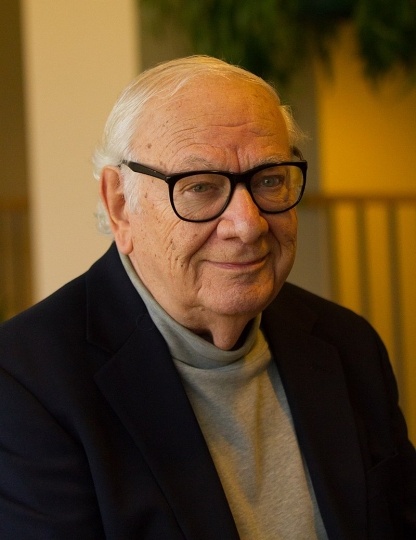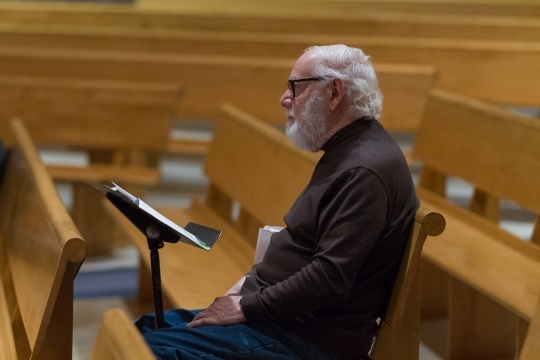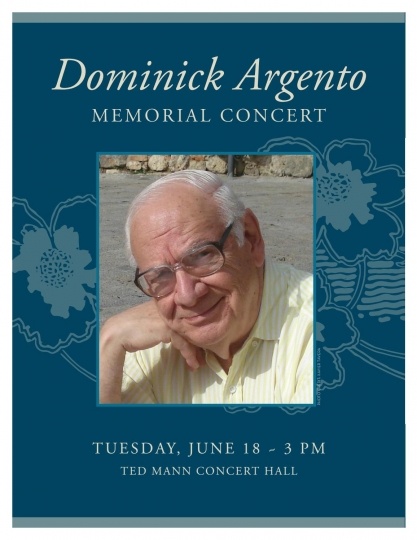Argento, Dominick (1927–2019)
Bibliography
Blain, Terry. “Minnesota Composer Dominick Argento Was the Last Great American Romantic: A Critic’s Tribute to the Lush, Alluring Music.” Minneapolis Star Tribune, March 1, 2019.
https://www.startribune.com/minnesota-composer-dominick-argento-was-the-last-great-american-romantic/506513932
Dominick Argento memorial concert program, June 18, 2019. Ted Mann Concert Hall, University of Minnesota.
https://issuu.com/uofmsom/docs/6-18-19_dominick_argento_memorial_p
PA 164
Dominick Argento papers, ca. 1950–2019
Performing Arts Archives, University of Minnesota, Minneapolis
Description: Score manuscripts, recordings, correspondence, and other materials created and collected by composer Dominick Argento.
https://archives.lib.umn.edu/repositories/9/resources/7851
Hujda, Kate. “Dominick Argento Papers Acquired by Performing Arts Archives.” University of Minnesota, January 9, 2019.
https://www.continuum.umn.edu/2019/01/dominick-argento-papers-acquired-by-performing-arts-archives
Lunden, Jeff. “Dominick Argento, Literature-Loving and Pulitzer Prize-Winning Composer, Dead At 91.” National Public Radio, February 22, 2019. https://www.npr.org/2019/02/22/697025521/dominick-argento-literature-loving-and-pulitzer-prize-winning-composer-dead-at-9
Page, Tim. “Dominick Argento, Composer Who Was a Modern Master of Opera, Dies at 91.” Washington Post, February 21, 2019. https://www.washingtonpost.com/local/obituaries/dominick-argento-composer-who-was-a-modern-master-of-opera-dies-at-91/2019/02/21/909b7f90-35f3-11e9-854a-7a14d7fec96a_story.html
Saya, Virginia. “Argento, Dominick.” Oxford Music Online.
http://oxfordmusiconline.com
——— . “The Current Climate for American Musical Eclecticism as Reflected in the Operas of Dominick Argento.” PhD diss., University of Cincinnati, 1989.
Chronology
1927
1945
1951
1951
1954
1954
1957
1957
1958
1963
1975
1979
1979
1986
1994
1997
1997
2004
2006
2016
2019
Bibliography
Blain, Terry. “Minnesota Composer Dominick Argento Was the Last Great American Romantic: A Critic’s Tribute to the Lush, Alluring Music.” Minneapolis Star Tribune, March 1, 2019.
https://www.startribune.com/minnesota-composer-dominick-argento-was-the-last-great-american-romantic/506513932
Dominick Argento memorial concert program, June 18, 2019. Ted Mann Concert Hall, University of Minnesota.
https://issuu.com/uofmsom/docs/6-18-19_dominick_argento_memorial_p
PA 164
Dominick Argento papers, ca. 1950–2019
Performing Arts Archives, University of Minnesota, Minneapolis
Description: Score manuscripts, recordings, correspondence, and other materials created and collected by composer Dominick Argento.
https://archives.lib.umn.edu/repositories/9/resources/7851
Hujda, Kate. “Dominick Argento Papers Acquired by Performing Arts Archives.” University of Minnesota, January 9, 2019.
https://www.continuum.umn.edu/2019/01/dominick-argento-papers-acquired-by-performing-arts-archives
Lunden, Jeff. “Dominick Argento, Literature-Loving and Pulitzer Prize-Winning Composer, Dead At 91.” National Public Radio, February 22, 2019. https://www.npr.org/2019/02/22/697025521/dominick-argento-literature-loving-and-pulitzer-prize-winning-composer-dead-at-9
Page, Tim. “Dominick Argento, Composer Who Was a Modern Master of Opera, Dies at 91.” Washington Post, February 21, 2019. https://www.washingtonpost.com/local/obituaries/dominick-argento-composer-who-was-a-modern-master-of-opera-dies-at-91/2019/02/21/909b7f90-35f3-11e9-854a-7a14d7fec96a_story.html
Saya, Virginia. “Argento, Dominick.” Oxford Music Online.
http://oxfordmusiconline.com
——— . “The Current Climate for American Musical Eclecticism as Reflected in the Operas of Dominick Argento.” PhD diss., University of Cincinnati, 1989.







